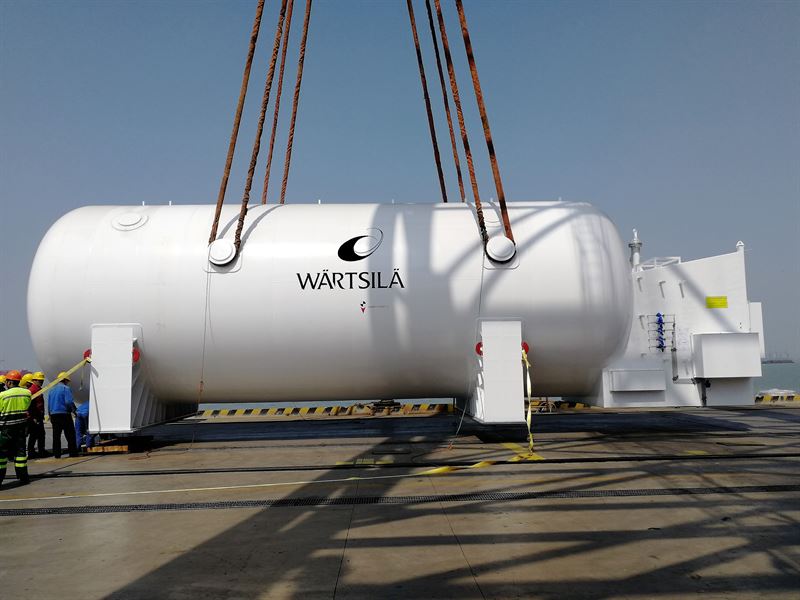
Wärtsilä LNGPac passes 100th order milestone
The technology group Wärtsilä’s Fuel Gas Supply Systems have passed a significant milestone with the 100th order being booked. Two new shuttle tankers being built for Singapore based AET Tankers will feature Wärtsilä 34DF dual-fuel auxiliary engines running primarily on LNG fuel, and fitted with LNGPac units. This contract brought the total number of orders received for this innovative system to 100.
First introduced in 2009, the Wärtsilä LNGPac has played an important role in establishing the viability of LNG as a marine fuel. The system comprises a bunkering station, the LNG fuel tank and related process equipment, as well as the control and monitoring system. The LNGPac fuel system can be offered as a standalone product, or as part of a complete propulsion system.
“A major reason for the global acceptance of LNG fuel for shipping is that Wärtsilä realised at an early stage that more than just a dual-fuel engine and a stand-alone LNG system was needed. LNG fuelled ships require a complete fuel handling system, and the innovative LNGPac system very successfully meets this requirement,” says Mathias Jansson, General Manager, Fuel Gas Supply Systems, Wärtsilä Marine Solutions.
The first LNGPac installation was for the chemical tanker ‘Bit Viking’ owned by Swedish operator Tarbit. This vessel was converted for LNG fuel operation in 2011, and its success paved the way for the rapid acceptance of the Wärtsilä solution. Today the LNGPac is installed on some 12 or more different types of vessel, including passenger ferries, tugs, dredgers and offshore vessels. Wärtsilä can deliver LNG systems for propulsion and power generation for any applicable type of ship or engine.
Since the original introduction of the LNGPac, Wärtsilä has continued to develop the system. The company has, for example, pioneered the utilisation of the cold energy stored in LNG by using it to cool the onboard HVAC and galley system. Another pioneering achievement has been the development of a compact LNGPac with an integrated gas valve unit (GVU) and airlock. The inline tank connection space for single shell tanks has been developed, as has been a dedicated LNG fuel pump based on the well-proven deepwell pump technology. As the maritime industry moves into a new era of connectivity and digitalisation, Wärtsilä is actively developing more smart features for the LNGPac, such as energy content measurement and real-time gas quality measurement.
The LNGPac system can be customised to the needs of each project on a case by case basis. Dedicated engineering is conducted from the beginning of the project to match the specific operational requirements, safety and classification society requirements.
Its innovative features have made the LNGPac a market leader in fuel gas supply systems.
Wärtsilä offers optimised maintenance agreements, including condition-based monitoring (CBM), for the LNGPac system.
Image caption: The Wärtsilä LNGPac has been an important enabler for LNG as a marine fuel.
Media contacts:
Mr Mathias Jansson
General Manager, Fuel Gas Supply Systems
Wärtsilä Marine Solutions
Tel: +358 10 7091599
mathias.jansson@wartsila.com
Ms Marit Holmlund-Sund
Senior Manager Marketing, Communications, Marine Solutions
Wärtsilä Corporation
Tel: +358 10 709 1439
marit.holmlund-sund@wartsila.com
Wärtsilä in brief:
Wärtsilä is a global leader in smart technologies and complete lifecycle solutions for the marine and energy markets. By emphasising sustainable innovation, total efficiency and data analytics, Wärtsilä maximises the environmental and economic performance of the vessels and power plants of its customers. In 2017, Wärtsilä’s net sales totalled EUR 4.9 billion with approximately 18,000 employees. The company has operations in over 200 locations in more than 80 countries around the world. Wärtsilä is listed on Nasdaq Helsinki.
www.wartsila.com

